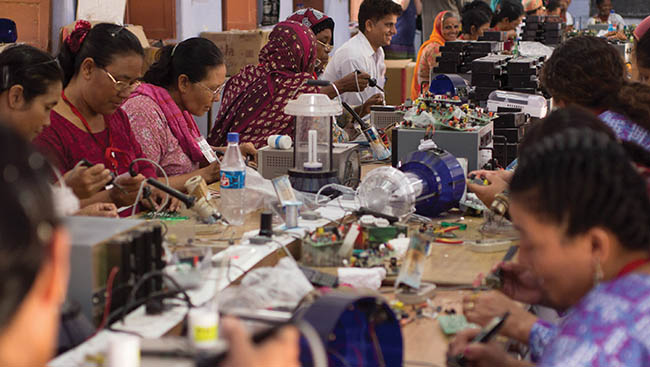Barefoot College has been training rural women without any formal qualification from around the world in becoming solar engineers
Rabindranath Tagore, the Noble laureate of India, spoke rightly when he said, “The highest education is that which does not merely give us information but makes our life in harmony with all existence.” Barefoot College shares the same spirit by employing traditional knowledge to equip individuals and their communities with solar, water, education, and professional well being, and how Barefoot does this is truly marvellous.
Inside a classroom you would find women aged 35-50 from various nationalities using just their hands and fingers – no translation, no interpreters, no written language – to configure, test and operate complex structures for setting up solar panels. Using this approach, the college has passed out 750 women solar engineers from 78 countries.
It started in 1965 when Sanjit (Bunker) Roy set out to volunteer in India’s eastern state of Bihar which was hit by one of the severest famines in India’s history. Roy describes his education as “snobbish and elitist”, indicating that what he saw in Bihar during that awful time changed his life.
Shortly after completing his university degree, Roy dedicated five years working as an unskilled labourer deepening and blasting open wells for water. “That meant going down a 100 ft open well by rope and blasting it with explosives. I lived with very poor and ordinary people under the stars and heard the simple stories they had to tell of their skills and knowledge and wisdom that books and lectures and university education can never teach you. My real education started then when I saw amazing people – water diviners, traditional bonesetters, midwives – at work. That was the humble beginning of the Barefoot College,” elaborates Roy.

Understanding the core structure and functioning of Barefoot College is fascinating. You will find educators without any formal degree, certification or qualification empowering students with solar knowledge and various other skills such as beekeeping and organic farming. Upon graduating, ‘Solar Mamas’ as they are called, impregnate these skills towards equipping their community with solar power. Not only that, these solar engineers return home with a bursting verve to synergize their knowledge and confidence with women in other nomadic communities within their region.
Roy stresses on admitting only females from illiterate background within the mentioned age group. Why? Because unlike men who have a tendency of leaving their community to look for work in urban spaces after acquiring the skillset, older women will stick to their communities, and are more mature and patient. Because they are older, their views and opinions are respectfully heard. And with training an illiterate woman to become a solar engineer, Roy hopes on transcending a very strong message that even the poor and illiterate or rather individuals lacking a formal skillset, can create an empowering ripple effect on rural grounds.

“The best woman solar engineer the Barefoot College has trained is a 55-year-old grandmother from Afghanistan who is looking after 200 houses she solar electrified in September 2005. She is semi-literate and does not know how to read and write,” Roy recalls.
Barefoot College’s model of education is simple and result-oriented; it does not adhere to an obligatory reliance on technology or heavy financial backing to move forward, which is probably why traditional knowledge does not resonate in national policy making. Urban solutions are geared towards addressing rural issues and in most cases, these policy makers/bureaucrats have never visited a village or noted their issues first hand. The dangerous outcome of such policies is the increasing trend of forced rural to urban migration.
With its hands-on approach Barefoot College’s vision has been able to reverse this trend in many African countries. “The global community believes solar empowerment is possible through “Centralised” top down approaches and methods where the communities get dependent on outside paper qualified engineers to carry out the repair and maintenance through Annual Maintenance Contracts. This has proved a global failure but the experts have not learnt any lessons. The World Bank view is [that] the Business Model is the answer. This approach may have benefitted the entrepreneurs and commercial for profit organisations pushing massive solar power plants but the rural communities have only suffered. They have had to buy inexpensive solar lights that do not last long and are unrepairable,” Roy adds.

In the words of Roy, the answer to global solar empowerment is a bottom up Gandhian Partnership Model where everyone – the government, the private sector, community-based organization and the rural communities – are accepted and treated as equal partners.
Barefoot College’s main campus is situated in Tilonia, Rajasthan. However, six branches of Barefoot Vocational Training Centres are soon to be established in Africa; each centre funded by the Government of India at a cost of USD $400,000 each. In 2015 a centre in Zanzibar was inaugurated in collaboration with the Government of Zanzibar.
By 2018, Barefoot College aims to reach an additional 150,000 people by tripling its model for solar electrification that is owned and managed by the community itself. Furthermore, Barefoot’s three-year strategic plan will triple the training of women solar engineers and bring light to an additional 120,000 households in 100 communities across Africa. The ambitious plan involves training a further 480 women to become Barefoot Solar Engineers by 2018. To support Barefoot College, visit their site or plan a visit to Tilonia!





